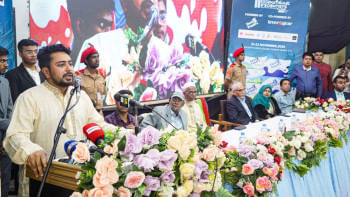Borshoborn celebrations in Indian capital

As I walked at around 5am on a Pohela Baisakh 21 summers ago from Science Laboratory Road to Ramna Botomul, it was the last time I could savour the joy of 'Borshoboron;. And when I melted into the sea of humanity clad in red-and-white saree and colourful panjabi and pyjama all around, I could fathom that Noboborsho is truly a mass event that knows no religious divide.
A part of that memory comes alive again when I attend the customary Borshoboron function at the Bangladesh High Commission here every year. This year -- on Friday (April 14) -- was no exception.
There was a musical soiree, recitation by senior Bangladeshi diplomats and local cultural group Spandan, and above all hopes of a new start at the celebration of the advent of Bangla New Year 1424 at the Bangladesh High Commission's Maitree Hall in New Delhi in the evening.
The celebrations began with Rabindranath Tagore's song “O Amar Desher Mati” by Counsellor Moazzem Hossain and his wife, after which the Bangladesh High Commissioner to India Syed Muazzem Ali said Pahela Baishakh came up with a brief speech with a message of “hope and optimism” for a better tomorrow.
Ali referred to two views about the possible start of Noboborsho as an event--either during the reign of 7th century King Sashanka or Mughal Emperor Akbar to start collection of land tax.
Rebutting a view by some that Nababarsho celebration was 'un-Islamic', he insisted that the celebrations in Dhaka are not only secular and non-communal but also the biggest event involving the masses cutting across religious lines.
Many Indian friends of Bangladesh, members of the Bengali community and officials of the High Commission and their families in traditional colours of Baishakh gathered at the Maitree Hall to welcome the New Year.
Recitation of Tagore's poem, “Aaji E Prabhatey Robir Kar”, and an array of songs by Tagore, Nazrul, Lalon, Rudra Mohd. Shahidullah and folk songs were presented by officials of the High Commission and Spandan, a cultural group.
There was no 'hilsa' when the programme was rounded off with a typical Bangla dinner. In deference to Prime Minister Sheikh Hasina's appeal not to catch hilsa at breeding time, the fish was not served. But the presence of khichri, ruhi maach bhaja, begun bhaja, murighonto and raj bhog in the menu made up for the absence of it.


 For all latest news, follow The Daily Star's Google News channel.
For all latest news, follow The Daily Star's Google News channel. 



Comments